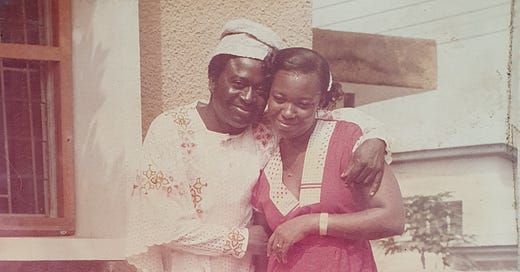
In my favourite photograph of my parents, they stand close together, smiling, he in a mostly white agbada and she in a mostly red dress, his cap slightly tilted, her hair curled. Behind them are the house they lived in before I was born and a Volkswagen Beetle that charms me in the way old things do. Ahead of them, out of frame, is the luminous promise of a future all theirs.
I’ve been told that this photograph was taken in Calabar in the early eighties. There is a muted retro style to it, as expected, nothing like the bright contemporary one of this second photograph by Mohamed Mahdy, where the woman stands with clasped hands and the man with his back against a wall. Each person does not appear to know that the other is there, even. Perhaps they are married, perhaps they are not. Perhaps they are neighbours, siblings, foes. The woman seems to be having a conversation with someone who is unseen, someone whose shadow alone can be seen. For a rare theatrical moment, I imagine that the woman and the man are lovers, but the woman is cheating on the man with the unseen person, and so the man is creeping up on them to say, “Yes, I knew it.”
Even though this photograph is quite different from that of my parents, it moves me too. Because the lace curtain billowing in the background reminds me of a certain curtain in my childhood home. Because I am reluctant to know people and yet I want to know the woman and the man. Because something about the scene fills me with nostalgia, a bittersweet strain that comes and goes since my father died a day before my birthday two years ago.
When I look now at my beloved photograph of my parents, I see that my father’s smile remained the same in his later years. That the tiny eyelet patterns on his agbada and the red polka dots on my mother’s dress somehow match. And then I wish, desperately, that my mother had saved her dress for me. ¶
About the Contributor
Suzanne Ushie has an MA in Creative Writing from the University of East Anglia. Her work has been published in several places and supported by Art Omi, Hedgebrook and Djerassi. She lives in Lagos, Nigeria. Read more of her writing in Visual Verse: An Anthology of Writing and Words, Lunch Ticket, and an interview in Saraba magazine.
This is the #2 edition of KINDRED, a series on TENDER PHOTO. Each contributor selects a photograph from their family or personal album, pairs it with another photograph from the Tender Photo archive, and writes a short reflection on why they have selected both photographs. The idea is to find an analogy between two photographs that might be similar or dissimilar, but connected to an experience, emotion, or idea.
TENDER PHOTO is a bi-weekly newsletter on African photography, published Wednesdays and Saturdays. See the archive for more features and commentaries on early to mid-career photographers, or submit your work. If this newsletter was shared with you, consider subscribing, or forward to a friend. Please whitelist the newsletter to ensure you never miss it.





